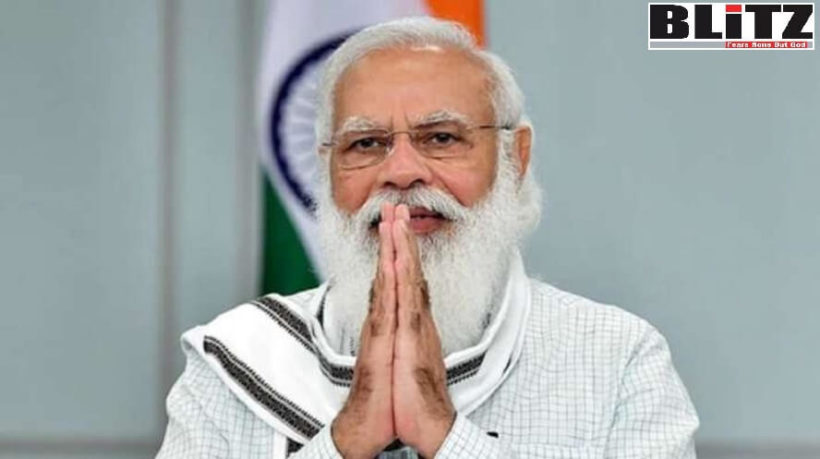by Salah Uddin Shoaib Choudhury
Despite ruthless criticism from the political opponents of the ruling Bharatiya Janata Party (BJP), Indian Prime Minister Narendra Modi has proved that his government has been committedly working for the people of the country. Bangladesh Prime Minister Sheikh Hasina has congratulated her counterpart Narendra Modi on achieving the historic milestone of administering “One Billion” COVID-19 vaccine doses on October 21, 2021 by his government.
In a message sent to Modi, Sheikh Hasina mentioned it as a remarkable achievement despite all the challenges that the Covid-19 pandemic has inflicted on humankind.
She recapped that it will be a major step towards the path of recovery and normalcy for India and the region.
She also informed Modi that her government has been carrying out a mass vaccination program in Bangladesh as more than 60 million people have been inoculated with vaccines, collected from multiple sources.
Sheikh Hasina reiterated that India has been an important source of COVID-19 vaccines for Bangladesh from the very beginning of the vaccination program. The prime minister conveyed her thanks to the government of India for resuming the export of AstraZeneca COVISHIELD vaccines, hoping that the procurement will continue uninterrupted in the coming days.
She expressed her firm belief to continue working together more closely with India to save the people of this region from the scourge of the COVID-19 pandemic and to counter the multifarious adverse fallouts of this pandemic.
It may be mentioned here that ever since coming to power through a landslide victory, Prime Minister Narendra Modi and his party are tirelessly and dedicatedly working in developing various sectors in India, including its economy as well as reducing the rate of unemployment and poverty. Due to his brilliant leadership qualities, Narendra Modi has already succeeded in making praiseworthy progress in the socio-economic sector while he also is working in guarantying a dignified position for India in the region and the world.
One of the roughest challenges for Prime Minister Narendra Modi and his government is combating religious extremism, terrorism and Islamist jihad. According to media reports, in India, the Islamic State’s Kerala module has revealed that around 3200 ISIS sleeper cells are operating in Kerala state alone.
Each of these cells has around 10 members, which translates to the presence of 32,000 Islamic jihadis in the state, with at least 40 percent of these being women. Many of these women have been converted to Islam from other faiths through narcotics jihad or grooming jihad (also known as Love Jihad and Sex Jihad). According to Indian authorities, members of the sleeper cells of the Islamic State travel to Tehran with accomplices and enter Syrian territory illegally.
This large-scaled permeation of sleeper cells suggests that the ideologues of the Islamic State are now embedded across Kerala, and its growth is difficult to monitor or check. Most of the members of the ISIS sleeper cells are part of its cyber brigade, are incorrigibly indoctrinated, and could pick up arms at any moment to fight for a caliphate led by the Islamic State.
According to Indian intelligence sources, these jihadis are mostly modern, highly qualified, and adept at using the latest technologies and gadgets. Apart from grooming, many were lured into this cause with promises of sex, money, positions, drugs, or foreign jobs. The Kerala brigade also involves people from the film and media industries, who are working closely with each other.
The members of the ISIS cells promote the jihadist ideology, albeit covertly. They commonly use social media to transmit information and spread propaganda; they often hold meetings and assist their “military brigade” (a kill squad) stealthily. They are the main mediators between the Islamic State and foreign intelligence groups such as Pakistan’s ISI.
The Talibanization of this southern state of India and the growing tendency among well-educated people in recent years to turn to jihad is not a fluke. It is the well-planned strategy of Pakistan-based jihad outfits that plan to use India’s home-grown jihadis, such as the ones in Kerala, to launch jihad terror attacks all over the country.
The Kerala-based jihadists, along with their Pakistan-based handlers, are operating in Kabul, and their next target could very well be Kashmir. In light of the repeated recent targeted killings of non-Muslims in Kashmir, the possibilities of a renewed jihad terrorist insurgency in the valley cannot be dismissed. The Kerala-based ISIS sleeper cells may move to Kashmir to advance the cause of the jihadis in case of such a planned insurgency.
Analysts said the victory of the Taliban in Afghanistan was impossible without the support of the Pakistani military. In between May and June of this year, Pakistan started to position the Taliban with a renewed image on the international stage.
Pakistani federal minister Shah Mahmood Qureshi publicly claimed that “the Taliban might wear baggy dresses but they have intelligent brains”, and Interior Minister Sheikh Rashid Ahmed asserted that the current Taliban leadership is a moderate one compared to the Taliban of 1996 that had publicly displayed the dead bodies of the then-Afghan president Najibullah and his brother. Again, Pakistan Prime Minister Imran Khan denied the US airspace for attacking the Taliban.
The Taliban commanders, on the other hand, were functional in Peshawar and Quetta in Pakistan, much like how Osama bin Laden was operating out of their backyard. They were transferring both their troops and those of Pakistan towards Kabul and other major Afghan cities. The Pakistani agency ISI was overseeing these jihad terror cells and has provided a fertile breeding ground for Islamic terrorists. When the most opportune time arrives, they may reach out to the jihadis-in-the-making in Kerala’s sleeper cells and order them to carry out massive acts of terror.
With the rise of radical Islamic jihadist forces in India, there also is another matter of grave security concern for the Indian intelligence and counterterrorism organizations. According to information, jihadist groups such as Islamic State, Al Qaeda, Lashkar-e-Taiba etcetera have been increasingly using Tablighi Jamaat members as the key vessel of spreading religious hatred and jihadism. Hands of Tablighi Jamaat have already been found behind a number of terrorist and jihadist acts throughout the world. With Tablighi Jamaat growing in size in India, it is certainly a huge concern for the authorities to immediately consider enforcing restrictions on the activities of this outfit, failing which, Prime Minister Narendra Modi and his government may face severe challenges posed by the jihadist groups in the coming days.
Online edition: weeklyblitz.net
About the writer:

Salah Uddin Shoaib Choudhury is a multi-award-winning anti-militancy journalist, research scholar, counterterrorism specialist and editor of Weekly Blitz. Follow him on Twitter @salah_shoaib












